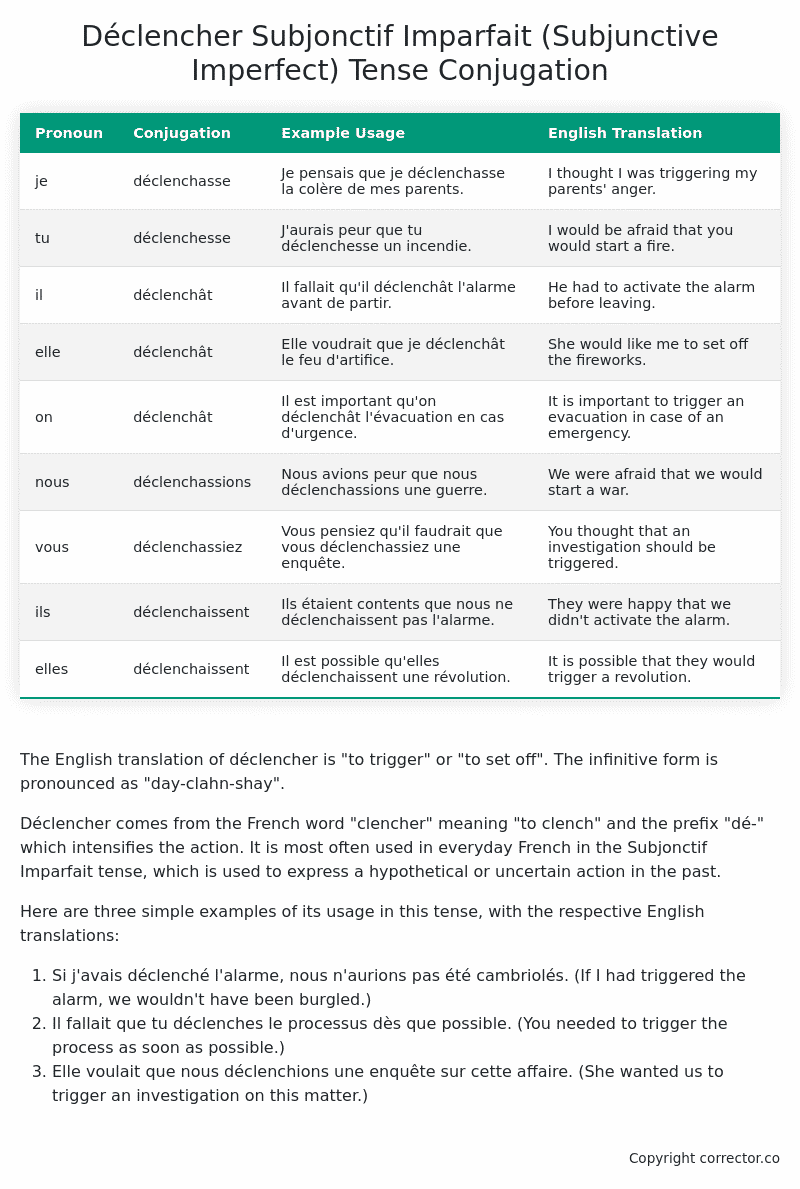Subjonctif Imparfait (Subjunctive Imperfect) Tense Conjugation of the French Verb déclencher
Introduction to the verb déclencher
The English translation of déclencher is “to trigger” or “to set off”. The infinitive form is pronounced as “day-clahn-shay”.
Déclencher comes from the French word “clencher” meaning “to clench” and the prefix “dé-” which intensifies the action. It is most often used in everyday French in the Subjonctif Imparfait tense, which is used to express a hypothetical or uncertain action in the past.
Here are three simple examples of its usage in this tense, with the respective English translations:
- Si j’avais déclenché l’alarme, nous n’aurions pas été cambriolés. (If I had triggered the alarm, we wouldn’t have been burgled.)
- Il fallait que tu déclenches le processus dès que possible. (You needed to trigger the process as soon as possible.)
- Elle voulait que nous déclenchions une enquête sur cette affaire. (She wanted us to trigger an investigation on this matter.)
Table of the Subjonctif Imparfait (Subjunctive Imperfect) Tense Conjugation of déclencher
| Pronoun | Conjugation | Example Usage | English Translation |
|---|---|---|---|
| je | déclenchasse | Je pensais que je déclenchasse la colère de mes parents. | I thought I was triggering my parents’ anger. |
| tu | déclenchesse | J’aurais peur que tu déclenchesse un incendie. | I would be afraid that you would start a fire. |
| il | déclenchât | Il fallait qu’il déclenchât l’alarme avant de partir. | He had to activate the alarm before leaving. |
| elle | déclenchât | Elle voudrait que je déclenchât le feu d’artifice. | She would like me to set off the fireworks. |
| on | déclenchât | Il est important qu’on déclenchât l’évacuation en cas d’urgence. | It is important to trigger an evacuation in case of an emergency. |
| nous | déclenchassions | Nous avions peur que nous déclenchassions une guerre. | We were afraid that we would start a war. |
| vous | déclenchassiez | Vous pensiez qu’il faudrait que vous déclenchassiez une enquête. | You thought that an investigation should be triggered. |
| ils | déclenchaissent | Ils étaient contents que nous ne déclenchaissent pas l’alarme. | They were happy that we didn’t activate the alarm. |
| elles | déclenchaissent | Il est possible qu’elles déclenchaissent une révolution. | It is possible that they would trigger a revolution. |
Other Conjugations for Déclencher.
Le Present (Present Tense) Conjugation of the French Verb déclencher
Imparfait (Imperfect) Tense Conjugation of the French Verb déclencher
Passé Simple (Simple Past) Tense Conjugation of the French Verb déclencher
Passé Composé (Present Perfect) Tense Conjugation of the French Verb déclencher
Futur Simple (Simple Future) Tense Conjugation of the French Verb déclencher
Futur Proche (Near Future) Tense Conjugation of the French Verb déclencher
Plus-que-parfait (Pluperfect) Tense Conjugation of the French Verb déclencher
Passé Antérieur (Past Anterior) Tense Conjugation of the French Verb déclencher
Futur Antérieur (Future Anterior) Tense Conjugation of the French Verb déclencher
Subjonctif Présent (Subjunctive Present) Tense Conjugation of the French Verb déclencher
Subjonctif Passé (Subjunctive Past) Tense Conjugation of the French Verb déclencher
Subjonctif Imparfait (Subjunctive Imperfect) Tense Conjugation of the French Verb déclencher (this article)
Subjonctif Plus-que-parfait (Subjunctive Pluperfect) Tense Conjugation of the French Verb déclencher
Conditionnel Présent (Conditional Present) Tense Conjugation of the French Verb déclencher
Conditionnel Passé (Conditional Past) Tense Conjugation of the French Verb déclencher
L’impératif Présent (Imperative Present) Tense Conjugation of the French Verb déclencher
L’infinitif Présent (Infinitive Present) Tense Conjugation of the French Verb déclencher
Struggling with French verbs or the language in general? Why not use our free French Grammar Checker – no registration required!
Get a FREE Download Study Sheet of this Conjugation 🔥
Simply right click the image below, click “save image” and get your free reference for the déclencher Subjonctif Imparfait tense conjugation!

Déclencher – About the French Subjonctif Imparfait (Subjunctive Imperfect) Tense
Formation
Common Everyday Usage Patterns
Interactions with Other Tenses
Subjonctif Présent
Indicatif Passé Composé
Conditional
Conditional Perfect
Summary
I hope you enjoyed this article on the verb déclencher. Still in a learning mood? Check out another TOTALLY random French verb conjugation!


